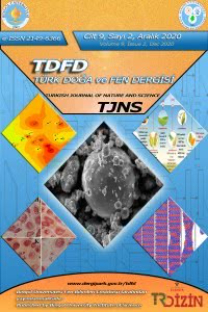Isparta ve Burdur Bölgesi’ndeki Betonarme Binanın Deprem ve Rüzgar Yükleri Altındaki Yapısal Dayanımı
Deneyimler ve yapılan çalışmalar, deprem ve rüzgar yükleri gibi yanal yüklerin yapılarda bariz bir şekilde düzensizliğe neden olduğunu göstermektedir. Bu nedenle yapının düzensizlik açısından şartlara uygun olarak değerlendirilmesi büyük önem taşımaktadır. Bu çalışmada 2018 TBDY’ne (Türkiye Bina Deprem Yönetmeliği) göre yapıların düzensizlik etkileri araştırılmıştır. Düşey düzensizliğe sahip bir yapı deprem ve rüzgar yükü altında analiz edilmiştir. Sismik analiz için tepki spektrum metodu ve rüzgar yükü analizi için TS498 kullanılmıştır. Etkin göreli kat ötelemesi, A1-Burulma düzensizliği ve B2-Yumuşak kat düzensizliği karşılaştırmalı olarak incelenmiş ve düzensizlik değerleri belirlenmiştir.
Anahtar Kelimeler:
Düzensizlik, Deprem, Rüzgar
Structural Resistance of a Reinforced Concrete Building under Earthquake and Wind Loads in Isparta and Burdur Region
It has been clearly seen from building experiences and studies that lateral load effects such as earthquake load and wind load make building irregularities more obvious. Hence, it is of great importance to evaluate the regularity of the structural systems in accordance with the conditions determined by the building regulations. In this paper, irregularity effects were investigated according to Turkish Building Earthquake Regulation (TBEC) 2018. A reference building which have vertical setback irregularity were analzed under earthquake and wind loads. Etabs software were used for structural analyses. Response spectrum method were used for the seismic analysis and TS498 for Wind load analysis. Effective relative storey drift, A1 –Torsional irregularity and B2 –Soft Storey Irregularity are comparatively investigated and Irregularity values were determined.
Keywords:
Irregularity, Earthquake, Wind,
___
- [1] Aly AM, Abburu S. On the Design of High-Rise Buildings for Multihazard: Fundamental Differences between Wind and Earthquake Demand. Shock and Vibration 2015;2015:1–22. https://doi.org/10.1155/2015/148681.
- [2] Al-Soudani M, Abbas AN, Numan HA. Assessment of Reinforced Concrete Structures under Wind and Earthquake Using Different Design Methods. Journal of Engineering Research 2021. https://doi.org/10.36909/jer.10411.
- [3] Atmaca B, Demir S, Murat Günaydin ;, Ahmet ;, Altunişik C, Hüsem M, et al. Field Investigation on the Performance of Mosques and Minarets during the Elazig-Sivrice Earthquake 2020;34(6). https://doi.org/10.1061/(ASCE)CF.1943.
- [4] Bayraktar D. Antalya ve Çevresinde Tarihsel Dönem Depremlerinin Antik Yapılara Etkisinin Araştırılması. Düzce Üniversitesi Bilim ve Teknoloji Dergisi 2019;7:352–68. https://doi.org/10.29130/dubited.446563.
- [5] Abbas M, Elbaz K, Shen S-L, Chen J. Earthquake effects on civil engineering structures and perspective mitigation solutions: a review. Arabian Journal of Geosciences 2021;14:1350. https://doi.org/10.1007/s12517-021-07664-5.
- [6] Çimen İ, Hanbay S, Erdem S. Yüksek Katlı Düzensiz Geometrili Diagrid Yapıların Deprem Performansının Deneysel ve Nümerik Analizi. 4th International Symposium on Natural Hazardsand Disaster Management, vol. 3, 2020, p. 982–92. https://doi.org/10.33793/acperpro.03.02.38.
- [7] Onat Ö, Usta P. 20 Katlı Betonarme Yapının Farklı Perde Duvar Yerleşimlerine Göre Deprem Analizi. European Journal of Science and Technology 2021;25:363–9. https://doi.org/10.31590/ejosat.912625.
- [8] Satılmış S. Birinci El Kaynaklara Göre Isparta Depremleri (19. Yüzyılın İkinci Yarısı). Selçuk Üniversitesi Edebiyat Fakültesi Dergisi 2018:297–312. https://doi.org/10.21497/sefad.515374.
- [9] Çarhoglu AI, Zabin P, Korkmaz KA. Investigation of Structural Behavior of Historical Churches under Effects: Isparta Hagia Banıya Church Case. International Civil Engineering & Architecture Symposium for Academicians, Antalya: 2014, p. 405–12.
- [10] Çöğürcü MT, Uzun M. Prefabrike Yapıların Rüzgar Yükü Güvenliğinin Belirlenmesi. Selcuk University Journal of Engineering ,Science and Technology 2019;7:171–88. https://doi.org/10.15317/scitech.2019.191.
- [11] Ümran M. Yüksek Yapılardaki Rüzgar Yüklerinin Hesabı. İnşaat Mühendisleri Odası 4. Ulusal Çelik Yapılar Sempozyumu. 2012, p. 27–38.
- [12] Kushwaha D, Saleem H, Shrivastava LP. A Comparative Study on High Rise Building for various Geometrical Shapes Subjected to Wind Load of RCC & Composite Structure using ETABS. International Research Journal of Engineering and Technology 2019;6:1553–8.
- [13] Çavdar Ö, Yolcu A. Mevcut Bir Okul Binasının Türk Bina Deprem Yönetmeliği 2018’e Göre Yapısal Düzensizliklerinin İncelenmesi. Ordu University Journal of Science and Technology Ordu Üniv Bil Tek Derg 2018;8:153–64.
- [14] Demir A, Dönmez Demir D, Erdem RT, Bağcı M. Torsional Irregularıty Effects of Local Sıte Classes ın Multıple Storey Structures, IJREAS 2010;258-262
- [15] Işık E, Özdemir M, Karaşin İB. Performance Analysis of Steel Structures with A3 Irregularities. International Journal of Steel Structures 2018;18(3):1083–94. https://doi.org/10.1007/s13296-018-0046-6.
- [16] Yeşim İlerisoy Z. Vertical Structural Irregularities in Earthquake Codes within the Scope of Architectural Design. Online Journal of Art and Design. 2019;7(1):231-53
- [17] İlgün A, Yorulmaz AM. Research on A1 Irregularity Status in Different Spectral Acceleration Coefficents on Reinforced Concrete Structures. Turkish Journal of Engineering. 2021;5(4):177-82. https://doi.org/10.31127/tuje.728820.
- [18] Keleş Y, Kasap H, Yaman Z. Evaluating the effects of different slab types on static and dynamic characteristics of structures. Challenge Journal of Structural Mechanics 2021;7:71. https://doi.org/10.20528/cjsmec.2021.02.003.
- [19] Uyan B, Erdem RT. Düşeyde Düzensiz Mevcut Betonarme Binaların Deprem Performansının Araştırılması. ALKÜ Fen Bilimleri Dergisi. 2021;7(2):71-83. https://doi.org/10.46740/alku.1013881.
- [20] Usta P, Bozdağ Ö, Onat Ö. Seismic Performance Evaluation of RC buildings using Irregularity based Indices. Tehnički Vjesnik 2022. https://doi.org/https://doi.org/10.17559/TV-20210720195034.
- ISSN: 2149-6366
- Yayın Aralığı: Yılda 4 Sayı
- Başlangıç: 2012
- Yayıncı: Bingöl Üniversitesi Fen Bilimleri Enstitüsü
Sayıdaki Diğer Makaleler
Suruç’ta (Şanlıurfa-Türkiye) Bazı Gıda Bitkilerin Geleneksel Kullanımları
Serhan YALÇIN, Hasan AKAN, Uğur ÇAKILCIOĞLU
Çift Silindirli Su Soğutmalı Bir Motorun Biyel Kolu Yapısal Analizi
Eda ŞAHİN, İdris CESUR, Hüseyin KAHRAMAN
3 Boyutlu Evrişimsel Sinir Ağı Kullanılarak Hiperspektral Görüntülerin Sınıflandırılması
Arzuhan ÇETİNDAĞ ÇİLTAŞ, Ayşegül ÖZTÜRK
TiO2 ile Kaplanan Güneş Panellerinin Güç Üretim Değişimi Analizi
Ortopedik Matkaplar İçin Bozucu Gözlemci Tabanlı Kemik Doku Değişim Tahmin Yaklaşımı Benzetimi
Füzyon ve Fizyon Fenomenleri İçin Doğrusal Olmayan Dalga Çözümlerinin İncelenmesi
Hirfanlı Baraj Havzasında Sıcaklık Serilerinin Homojenlikve Eğilim Analizleri
